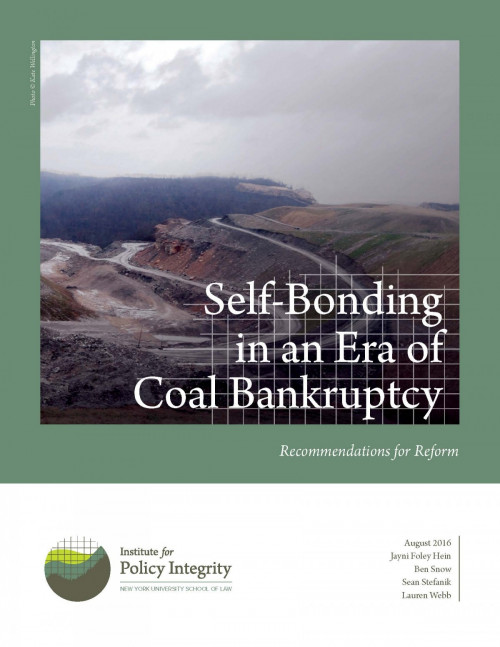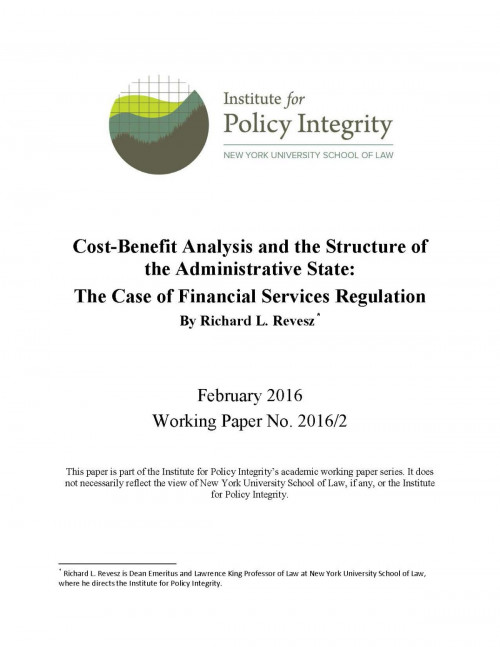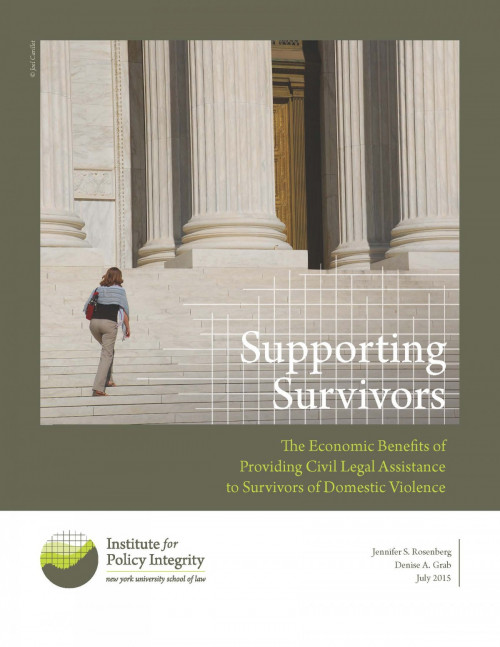-
Comments on Delay of Department of Labor’s Fiduciary Rule
The Department of Labor’s Fiduciary Rule requires investment advisors to serve the best interests of their retiree clients. In August 2017, Labor proposed to stay the rule’s enforcement provisions. In our comments on the proposed delay, we argue that the delay violates basic administrative law principles.
-
Comments to OSHA on Beryllium Standards Revocation
In public comments to the Occupational Safety and Health Administration, we highlight some critical problems with the agency’s cost-benefit analysis in its proposed revocation of standards to protect workers from exposure to beryllium. These ancillary standards were designed to protect workers in the construction and shipyard sectors.
-
Public Comments to OIRA on Regulatory Review Guidance
President Trump’s recent Executive Order on reducing regulation directed agencies to identify two existing regulations to repeal when issuing a new regulation, and to offset all incremental costs of new regulations. On February 2, 2017, the Office of Information and Regulatory Affairs (OIRA) released interim guidance on how it plans to implement the Executive Order, and we submitted comments on the guidance.
-

Self-Bonding in an Era of Coal Bankruptcy
Recommendations for Reform
Federal law requires coal companies to reclaim and restore land and water resources that have been degraded by mining. But at many sites, reclamation occurs slowly, if it all. Mining companies are required to post performance bonds to ensure the successful completion of reclamation efforts should they become insolvent, but regulators have discretion to accept “self-bonds,” which allow many companies to operate without posting any surety or collateral. As the coal industry experiences financial distress and coal companies declare bankruptcy, the viability of future reclamation work is endangered. This report offers recommendations to help regulators better assess coal companies’ financial health and take steps to curtail self-bonding.
-
Comments on FDA Proposal to Restrict Artificial Tanning
We recently submitted comments in response to the Food and Drug Administration’s (FDA) proposed rule to restrict the use of sunlamps used for artificial tanning. We concluded that although the proposed rule takes a significant step in reducing the risks of artificial tanning, the FDA should strengthen the justification for this proposed rule.
-

Cost-Benefit Analysis and the Structure of the Administrative State
The Case of Financial Services
The viability and desirability of conducting cost-benefit analysis of financial regulation is a subject of intense academic debate. Opponents claim that such analysis is feasible for environmental regulation but not for financial regulation because of the difference in the benefits that require monetization in the respective areas. This article, which will be published in a forthcoming edition of the Yale Journal on Regulation, argues that the recent debate misses an important part of the problem. In large part, cost-benefit analysis of financial regulation cannot currently be performed successfully because of institutional shortcomings, not analytical difficulties. Compared to Executive Branch agencies, independent agencies, like the major financial regulatory agencies, lack the capacity to do cost-benefit analyses of acceptable quality. Fortunately, there are good Executive Branch models that could be exported to the financial regulatory agencies.
-
Payday Lending Public Comments
The Consumer Financial Protection Bureau (CFPB) is currently developing regulations that could protect millions of lower-income Americans from predatory payday lenders. We submitted public comments on the agency’s regulatory approach.
-
Hein Joins Experts to Discuss Oil-by-Rail
Jayni Hein, our policy director, presented today at a national conference on oil-by-rail policies, “Oil Train Response 2015: Community Risks & Solutions,” in Pittsburgh, Pennsylvania.
-

Supporting Survivors
The Economic Benefits of Providing Civil Legal Assistance to Survivors of Domestic Violence
Evidence indicates that the social costs of domestic violence extend far beyond the private costs borne by victims and their immediate families. Supporting Survivors analyzes the social costs of this public health problem and explores civil legal aid efforts, which have been shown to reduce rates of domestic violence by helping victims obtain protective orders and other services.
-
Consumer Product Safety Commission Public Comments
Since 1996, there have been at least 285 incidents of child strangulation by window covering cords. The Consumer Product Safety Commission is considering a regulation to address this issue, and we recently submitted public comments on the Commission’s advance notice of proposed rulemaking. We offered a number of suggestions for improving upon the Commission’s preliminary analysis of the costs and benefits of eliminating cords from window coverings. These included recommendations that the Commission consider the prevention of parental grief as an unquantified benefit of regulation and that it perform separate cost-benefit analyses for each major category of covering (e.g., vinyl blinds, wood blinds, roman shades).
Viewing recent projects in Consumer and Healthcare Protection
